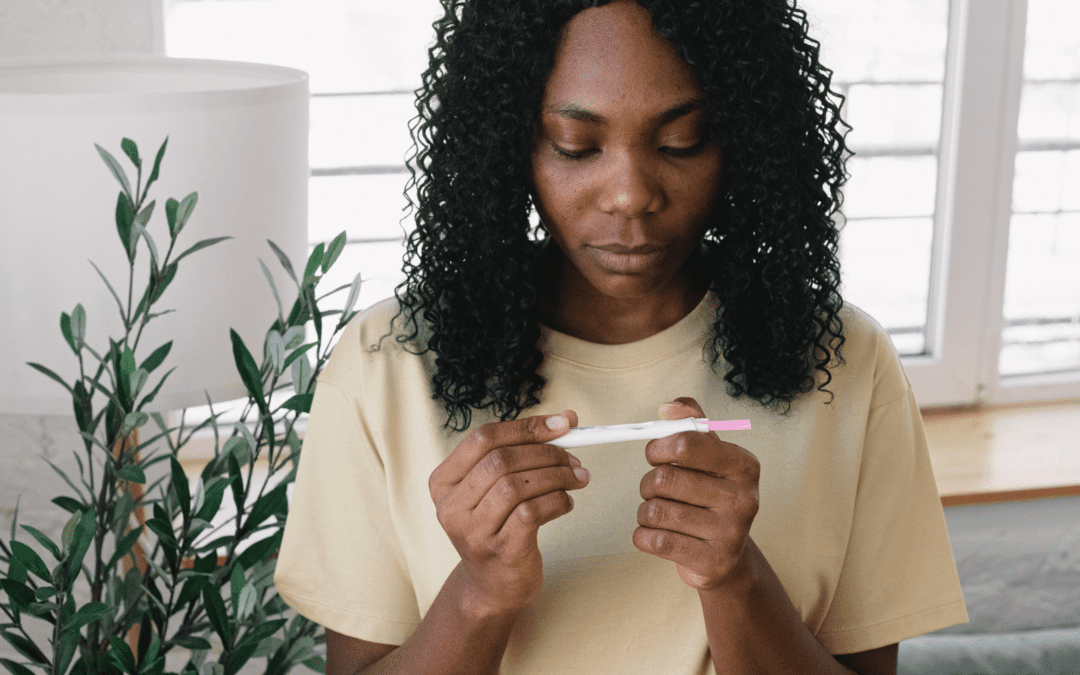You might wonder if home pregnancy tests provide accurate results. Regardless of how you feel about being pregnant, there are a few things you should know about home pregnancy tests.
Keep reading to learn more.
How Do Pregnancy Tests Work?
About 10 days after conception (when a sperm fertilizes an egg), the embryo implants into a woman’s uterus. Her body then releases the hormone human chorionic gonadotropin (HCG) to sustain the pregnancy.[1] Home pregnancy tests detect the presence of HCG in the urine.
When is the Best Time to Take a Pregnancy Test
Although the body produces HCG at implantation (10 days after conception), HCG may not be detectable in the urine until about 14 days after conception. So, most home pregnancy tests recommend testing once you’ve missed your period. If taken before a missed period, the test could be negative even though a woman is early in her pregnancy.[2]
How Accurate are Pregnancy Tests?
Every home pregnancy test works differently, so women should read and follow the instructions that come with the test. When used correctly, home pregnancy tests can be up to 99% accurate.[3]
If taken too early, used improperly, or improperly read, the test could be negative. After a negative home test, women should wait a few days and then retest.
Where Can I Get a Pregnancy Test?
Home pregnancy tests are available over the counter (without a prescription). Some women find that digital tests are easier to read.[4] Regardless of the type used, carefully read the instructions. Some women prefer going to a clinic to confirm pregnancy.
You can scheule a free pregnancy test at NorthState Care Clinic. Give us a call at 530-246-7075 to get started.
When to Take a Pregnancy Test with an Irregular Period
If your period is irregular, you can take a pregnancy test two weeks after sex or if you develop pregnancy symptoms.
What’s the Difference Between PMS and Pregnancy Symptoms?
Some pregnancy symptoms make feel and look like premenstrual symptoms (PMS), such as breast tenderness, fatigue, moodiness, or spotting. However, other symptoms such as nausea, headaches, frequent urination, and weight changes, are often present in pregnancy but not before a period. If you’re experiencing any of these symptoms, take a pregnancy test at home.[5]
Can You Have a Positive Pregnancy Test after a Miscarriage?
After a miscarriage, positive pregnancy tests can occur for two to four weeks as the HCG levels continue to decrease. If you’ve experienced a miscarriage, you should speak with your healthcare provider about next steps.[6]
Why is One Pregnancy Test Positive and the Other Negative?
If you’ve missed your period and taken pregnancy tests that gave you both positive and negative results, wait a few more days before taking additional tests. If the results still vary, speak with a healthcare provider.
Call NorthState Care Clinic to speak to our qualified healthcare team!
Do You Need a Blood Pregnancy Test?
In a clinical setting, blood tests detect the presence and the amount of HCG in blood. Healthcare providers use blood tests to verify pregnancy, to estimate the gestational age, and to monitor the progression of pregnancy. However, urine pregnancy tests suffice for most women.[7]
Can You Have an Abortion After a Positive Pregnancy Test?
Although a positive pregnancy test detects HCG in your urine, the results do not tell you how far along you are in your pregnancy or whether the pregnancy is viable. The best way to figure that out is to receive an ultrasound.
Call us at 530-246-7075 to see if you qualify for a free ultrasound.
What Do You Do After a Positive Pregnancy Test?
The first few moments after a positive pregnancy test can be scary. Women can feel angry, sad, nervous, happy, or simply numb. Whatever the results of your pregnancy test may be, we will provide the information you need to make the best decision for your health and future.
Give us a call at 530-246-7075 or schedule an appointment online. All services are confidential and free of charge.
Please be aware that NorthState Care Clinic does not provide or refer for abortion services.
Sources
- American Pregnancy Association. (n.d.). Pregnancy Tests. American Pregnancy Association. https://americanpregnancy.org/healthy-pregnancy/are-you-pregnant/pregnancy-tests/
- Mayo Clinic. (2022, December 23). Home pregnancy tests: Can you trust the results? Mayo Clinic. https://www.mayoclinic.org/healthy-lifestyle/getting-pregnant/in-depth/home-pregnancy-tests/art-20047940
- Tomlinson, C., Marshall, J., & Ellis, J. E. (2008). Comparison of accuracy and certainty of results of six home pregnancy tests available over-the-counter. Current medical research and opinion, 24(6), 1645–1649. https://doi.org/10.1185/03007990802120572
- Johnson, S., Cushion, M., Bond, S., Godbert, S. & Pike, J. (2015). Comparison of analytical sensitivity and women’s interpretation of home pregnancy tests. Clinical Chemistry and Laboratory Medicine (CCLM), 53(3), 391-402. https://doi.org/10.1515/cclm-2014-0643
- John D. Jacobson. (2022, November 10). Pregnancy Test. Medline Plus. https://medlineplus.gov/ency/article/003432.htm
- Mayo Clinic Staff. (2023, September 8). Miscarriage. Mayo Clinic. https://www.mayoclinic.org/diseases-conditions/pregnancy-loss-miscarriage/symptoms-causes/syc-20354298
- FDA. (2019, April 29). Pregnancy. FDA. https://www.fda.gov/medical-devices/home-use-tests/pregnancy

